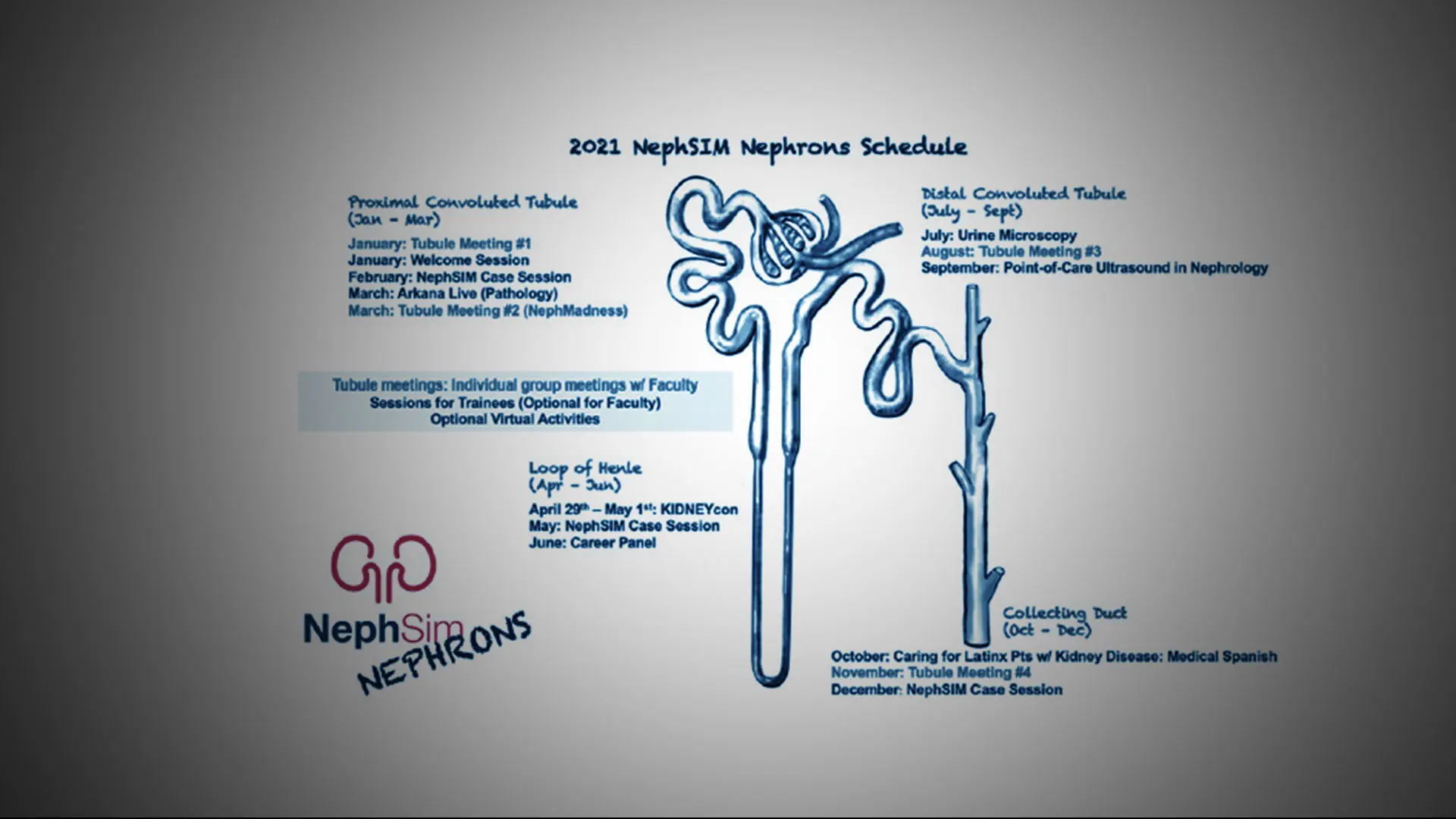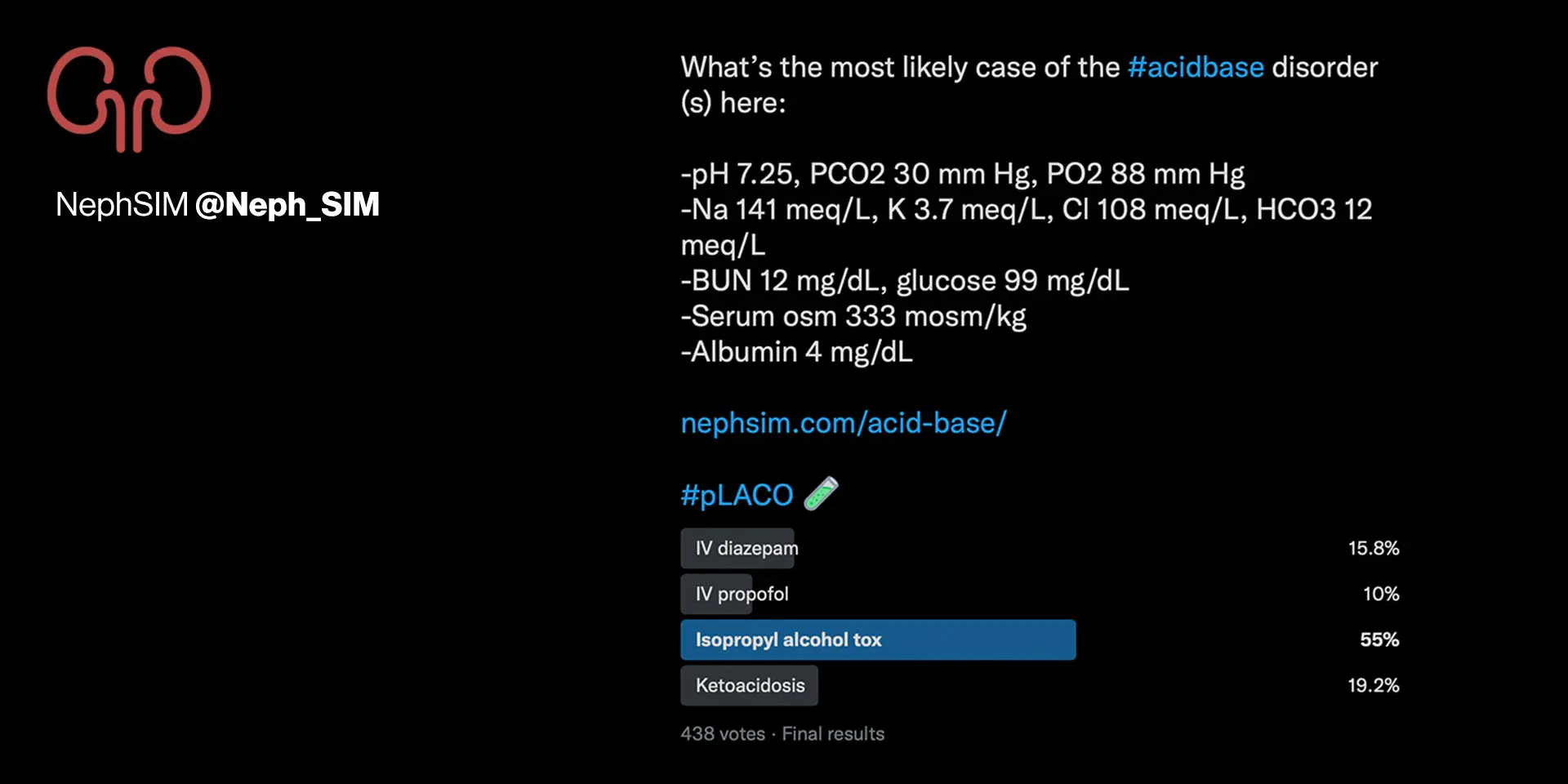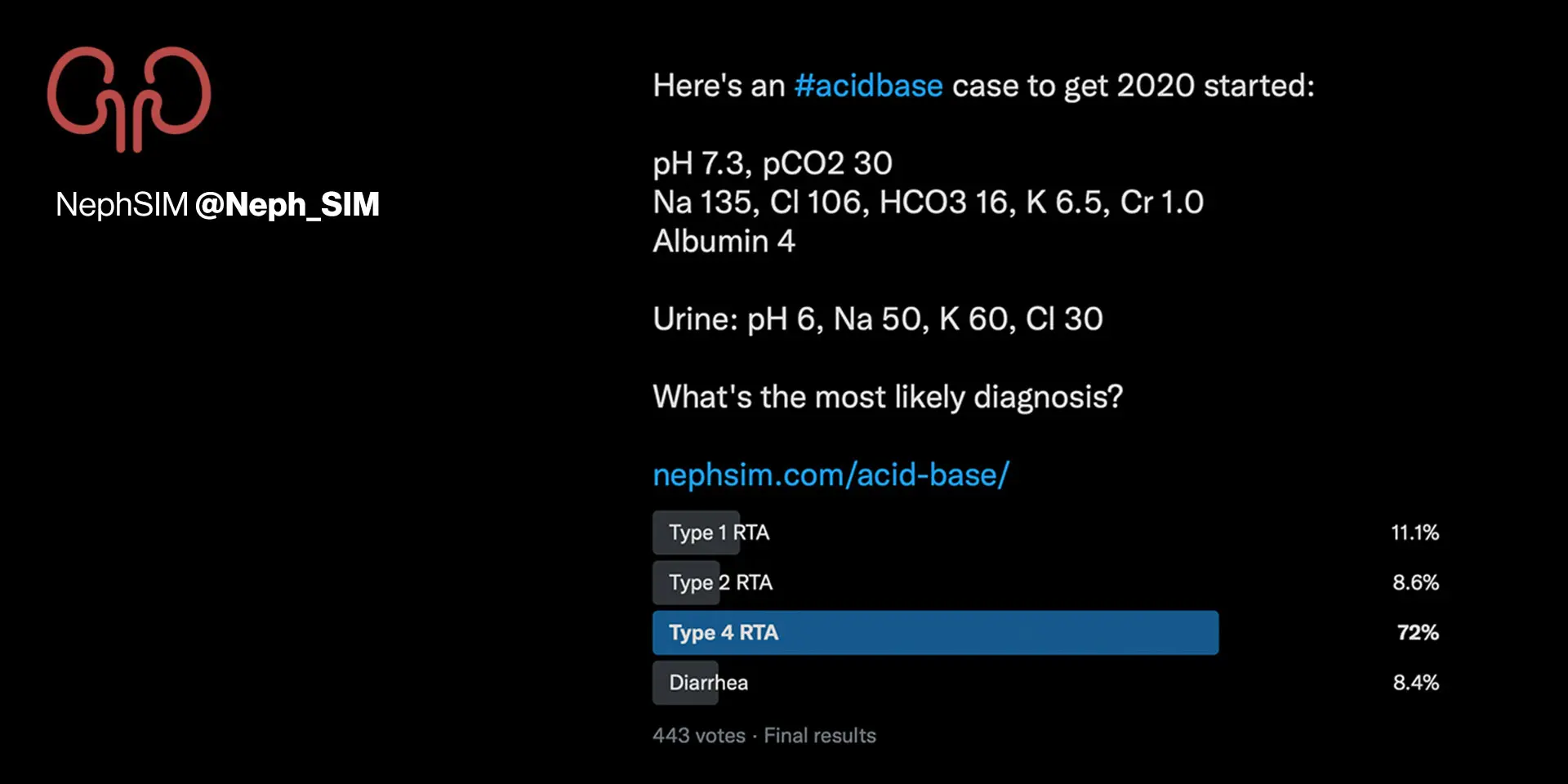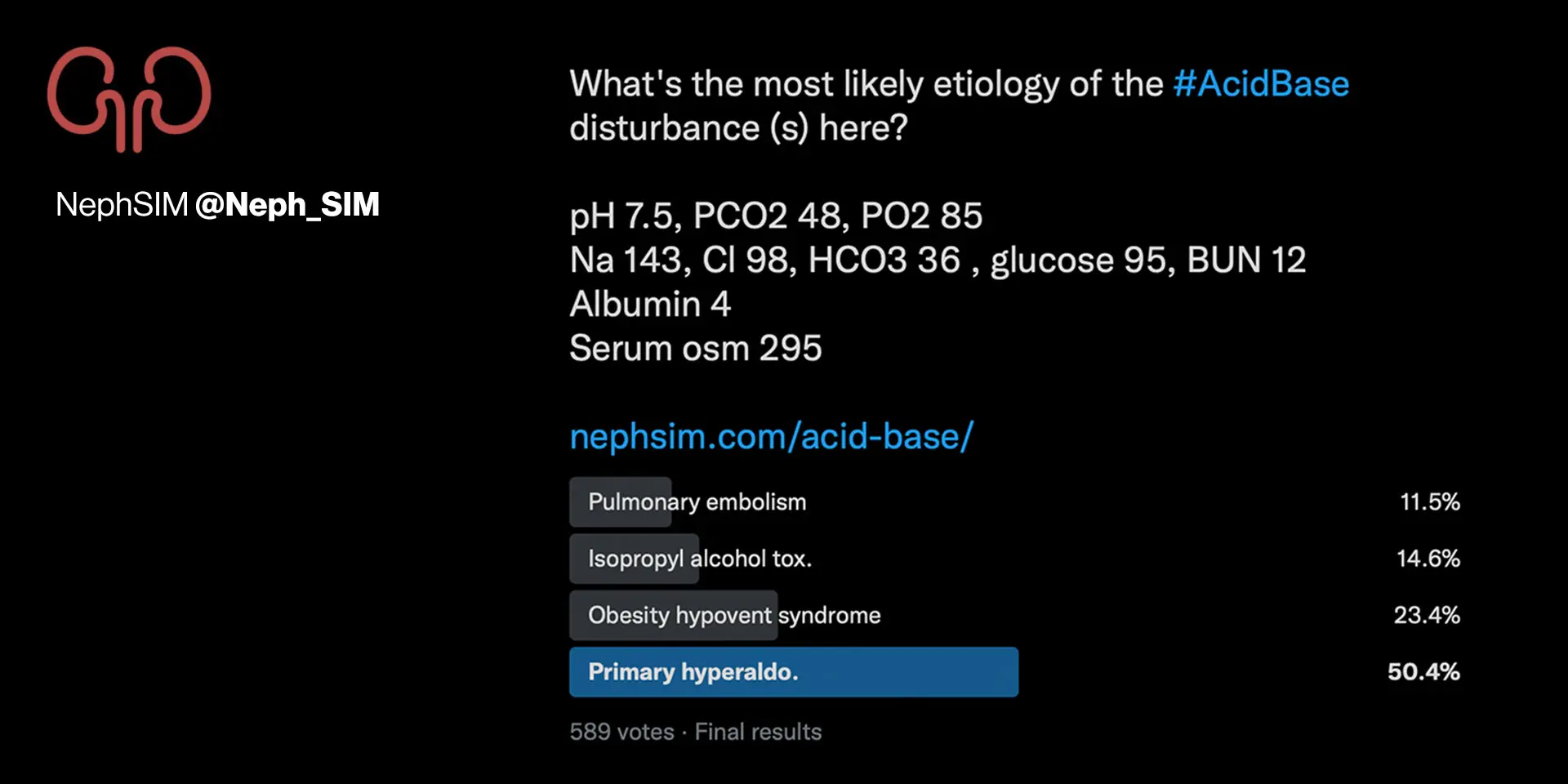Acid-base disorders are a challenging topic for many postgraduate nephrology trainees to comprehend. But Samira Farouk, MD, MS, FASN, found a way to make it more approachable and engaging: one tweet at a time.
“It was a random idea I had,” explains Dr. Farouk, Associate Director of the Nephrology Fellowship Program at the Icahn School of Medicine at Mount Sinai. “I started using Twitter's polling feature to share laboratory values and asked users to select the most likely etiology of the disorder from four options, with the correct answer shared in a subsequent tweet. I noticed the tweets were getting a lot of engagement—as many as 600 users voting in the polls—and a colleague suggested we look at several polls to see if there were any trends.”
Reviewing 20 polls posted between April 2019 and February 2020, Dr. Farouk noted that each garnered a mean of 323 ± 136 responses, 6,719 ± 2,978 organic impressions—the number of users who potentially saw the tweets—and 454 ± 181 engagements—the number of times a user interacted with the tweets. The poll engagement rate was 6.9 ± 1.3 percent, which exceeded the median for tweets across health (0.05 percent) and higher education (0.08 percent). Equally encouraging, 52 ± 17.3 percent of users answered the polls correctly. The results were published October 2020 in Advances in Physiology Education.
“Based on the results we observed, we were able to show that Twitter is an effective way to reach a wide audience and to teach a challenging topic,” Dr. Farouk says.
Making Challenging Concepts Approachable
Making challenging nephrology concepts more engaging and approachable has long been Dr. Farouk’s specialty. When she was an internal medicine resident at Icahn Mount Sinai, she kept simple one-page diagrams in the pocket of her white coat to help her understand and teach complex topics. But her armamentarium has grown more sophisticated over the years through the adoption and co-development of dynamic free open-access medical education (FOAMed) and social media tools that are enabling her to reach and train a new generation of nephrologists.
“Those of us who are working in this education space are focused on how we can democratize nephrology education to expose trainees to the field in ways they have not previously been exposed,” explains Dr. Farouk, Associate Professor of Medicine (Nephrology), and Medical Education, at Icahn Mount Sinai. “The objective is not just a better and more engaging approach to teaching traditionally complex topics but also to showcase the different nephrology careers or areas of specialization to trainees so we can recruit more applicants.”
Dr. Farouk has made considerable strides in meeting that objective through nephrology simulation (NephSIM), an award-winning, mobile-optimized FOAMed tool she co-developed in 2018. She has transformed it into a more robust nephrology education hub with added teaching resources such as a urine image gallery and an expanded range of fictitious patient cases available through the tool’s Pick Your Case! feature. She also used it to launch NephSIM Nephrons, a year-long program designed to foster interest in nephrology among medical trainees through virtual learning, networking, and mentoring experiences.
The program has enrolled 112 trainees from 24 countries, who are divided into groups and paired with NephSIM Nephrons faculty mentors based on their interests and geographical location. These groups can work on a faculty-mentored case that will be published on NephSIM Nephrons, and all trainees are invited to participate in virtual monthly education events and career panels. Educational experiences have included an interactive kidney pathology session conducted by Arkana Laboratories, networking events such as KidneyCon, and FOAMed-driven sessions such as NephMadness, a social media-based interactive educational game inspired by the National Collegiate Athletic Association’s annual basketball tournament.
First-year participant feedback has been encouraging and Dr. Farouk says a second round of applications is being considered. “It is a bit naïve to think that a one-year virtual curriculum is going to make somebody want to be a nephrologist,” she admits. “But the program is putting nephrology on the participants’ radar, and we are interested in seeing how many of them become nephrology fellows and what they do after that.” A synopsis of the program and trainee feedback was published July 2021 in KidneyNews.
Virtual Approach to Urine Microscopy
The Arkana Laboratories session inspired Dr. Farouk to initiate another study that culminated in the launch of monthly virtual urine microscopy teaching sessions at Icahn Mount Sinai. The sessions are intended to increase internal medicine residents’ exposure to this technique, which is vital in initial evaluations of patients with kidney disease. A voluntary, anonymous survey of residents found that 48 percent (28 of 59) of respondents had performed urine microscopy at least once during their training and that 75 percent (44 of 59) of respondents did not feel comfortable performing urine microscopy.
“The sessions were accelerated by the COVID-19 pandemic, specifically the adoption of video conferencing software in training,” Dr. Farouk says. “The more we learned how to apply the technology, and features such as annotation, the more we realized we could deliver a more interactive and engaging approach to learning this technique than using conventional methods. When we did the sessions, the trainees indicated they enjoyed them, and our plan is to continue conducting them.” The results of the study were published January 2021 in Kidney360.
Broadening to Other Disciplines
Dr. Farouk’s success in applying FOAMed and social media tools to engage and educate the next generation of nephrologists has drawn considerable interest from other disciplines seeking to do the same. She worked with colleagues in hepatology and infectious disease to develop online hubs for creating and sharing educational content. She also adapted the NephSIM template to create mobile-optimized, case-based learning tools for ophthalmologists (20/20SIM), rheumatologists (RheumSIM), gastroenterologists (GI Sim), and neurologists (NeuroSIM). But her main focus remains applying this knowledge to benefit nephrology. She is exploring opportunities to make NephSIM Nephrons more appealing for targeted trainees and she has launched a study, made possible by a 2020 William and Sandra Bennett Clinical Scholars Grant, to assess the impact of implementing NephSIM into an existing medical student nephrology pathophysiology course. The goal of all these undertakings is to expand, not replace, training modalities.
“People always ask me if FOAMed tools will replace lectures and books and my answer is ‘no,’” Dr. Farouk says. “These tools are really designed to be supplementary. We know that everybody has different learning styles, and some platforms or tools are not suited to them. FOAMed provides us with an opportunity to deliver more and different types of learning experiences, and that benefits trainees because they can find what works best for them."
Featured
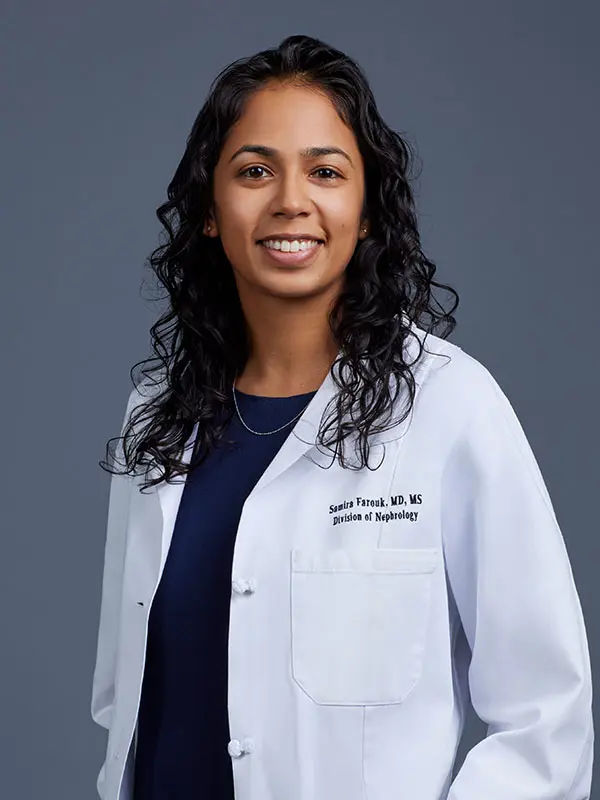
Samira Farouk, MD
Associate Professor of Medicine (Nephrology), and Medical Education
